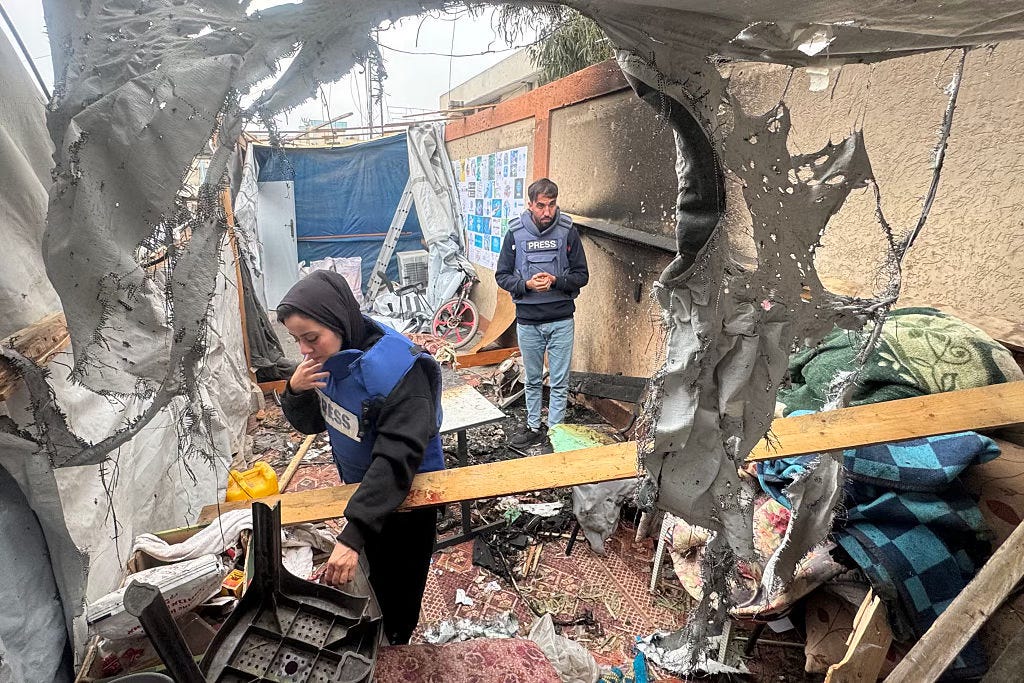Israel Is Willfully Ignoring the Protections of Journalists
The IDF is targeting Palestinian journalists with fulsome excuses.
Journalism is too opaque and misunderstood. Chills gives a behind-the-scenes look at how dangerous investigative journalism gets made.

Two journalists were killed in their tent yesterday in Gaza’s Khan Yunis, in what human rights groups are calling a targeted attack by Israeli forces. At least one of them was working for a pro-Palestinian network, the Committee to Protect Journalists reported. Nine other journalists were injured.
It’s hardly the first time Israel has deliberately targeted journalists in the now years-long Gaza bombardment, which has become the deadliest conflict on record for journalists and media workers. The war in Gaza has killed more journalists than the U.S. Civil War, World Wars I and II, the Korean War, the Vietnam War, the wars in Yugoslavia and the post-9/11 war in Afghanistan combined, according to Brown University’s Watson Institute for International and Public Affairs.
What makes this conflict stand out in terms of the press, beyond being so remarkably deadly, is the shocking extent of methodical targeting by Israel. The Geneva-based nonprofit Euro-Mediterranean Human Rights Monitor called yesterday’s attack on the media “part of a broader, deliberate campaign by Israeli forces to suppress independent reporting from the Gaza Strip by targeting those who document and expose the reality on the ground, especially amid the ongoing genocide.” The group emphasized what it calls a “glaring” lack of international accountability for Israeli war crimes.
Lima Bustami, the director of the group’s legal department, said in a statement that the targeting of Palestinian journalists is a “declaration of impunity in action.” It sends the message, she said, that “Your truth means nothing. We can kill you with the camera in your hand, and no one will save you.”
To be clear, Israel has denied that it has ever targeted journalists specifically. “There is no policy of targeting media personnel,” a senior official said in June 2024, instead attributing the record number of journalists killed to the overall bombardment that has flattened Gaza and killed so many civilians. (Which, of course, is problematic in itself in terms of war crimes and crimes against humanity.)
As of June, 30 percent of the journalists and media workers killed, according to CPJ, worked for the largest Hamas-run outlet in Gaza, the al-Aqsa media network.
The Guardian asked a senior IDF spokesperson at that time about the al-Aqsa casualties and was told that there was “‘no difference’ between working for the media outlet and belonging to Hamas’s armed wing, a sweeping statement legal experts described as alarming.”
“It’s a shocking statement,” Adil Haque, a law professor at Rutgers University told the newspaper. He explained that the position showed “a complete misunderstanding or just a willful disregard for international law.”
That’s because journalists are noncombatants, no matter who funds them or what propaganda they spout (see: Fox News). If they are not acting as militants — aside, this is why we don’t carry arms, even in combat zones — then journalists are entitled to protections under the Geneva Conventions. Journalists only lose immunity from attack “for such time as they take a direct part in hostilities,” writes the nonprofit Article 19. Although al-Aqsa may be anti-Semitic and pro-Hamas, that doesn’t mean they don’t deserve the same protections as any other media outlet. And, as much as I am reluctant to say this, I will die on this hill.
“Reporting the news is not direct participation in hostilities,” Janina Dill, a professor at the University of Oxford and expert in the laws of war, told The Guardian. “Even if they reported the news in a biased way, even if they did propaganda for Hamas, even if Israel fundamentally disagrees with how they report the news. That is not enough.”
Still, Israeli officials have employed a precarious and unproven “Yes, but…” strategy when it comes to al-Aqsa journalists: “In response to a Guardian request for details about multiple al-Aqsa employees who had been killed, an IDF spokesperson said it ‘does not target civilian objects’ but that the outlet ‘employs terrorists and affords them the facade of journalists.’”
There is no room for equivocation. Journalists need and internationally are allowed protection. There is good reason for that.
It’s not only the dead journalists and their families who lose in this war if so-called biased journalists are murdered. It’s all of us. The journalists who died in Gaza yesterday did so because they were the only ones who could even be at the sites of danger to report what was happening — foreign journalists are barred from access. The deaths of these brave men and women mean that even fewer of the few journalists allowed in the war zone already are able to be there anymore to tell us what is being perpetrated in our names, or against innocents. Or in not our name but in a geopolitically important situation about which we need to be informed to understand the future of a critically important slice of the world.
Chills is self-funded, without ads. If you want to be a part of this effort, of revealing how difficult reporting is made — of sending me to places like Ukraine to report for you — I hope you will consider subscribing for $50/year or $7/month.




I read this with such sadness. No excuses for this.